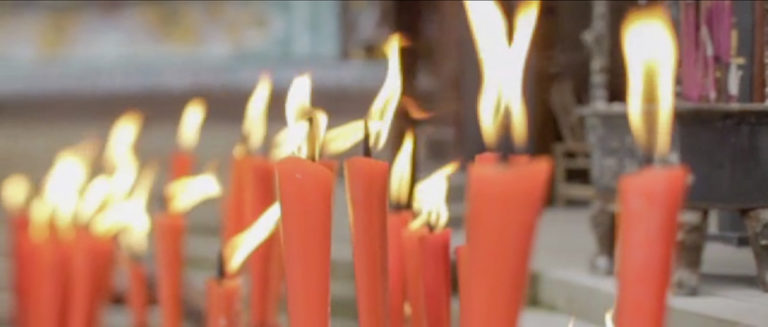here is a column i wrote for Antiwar.com that will not get published:
On Friday the torch arrives in Hong Kong. Demonstrators from around the world are arriving ahead of time to take advantage of this opportunity: after Hong Kong the flame will be traveling through Mainland China, where security will be extremely tight. This may be the last chance for demonstrators to make a statement that will be heard on the international stage.
This Friday is pivotal for the well-being of the Games. If protestors manage to disrupt the flame – and get beaten by patriots and police for their efforts – the tense atmosphere that has been gathering around the Beijing Olympics since March will reach a new and perhaps irreversible height.
Several pro-Tibetan groups are forming an alliance and have organized strategies to disrupt the torch’s path. As seen in other cities, small groups harassing the flame along its path has proven to be successful. Hong Kong has seen its share of city-wide demonstrations. Pro-Democracy marches in Hong Kong attracted up to 500,000 people and the city is much more open, educated and liberal than its massive cousin to the west.
Although the true democratic nature of Hong Kong can be debated, the people consider themselves blessed with more political freedom than Mainland China and have taken to the streets to defend that freedom.
In 2005, when the WTO Ministerial was held in Hong Kong, the local security forces were not prepared for the organized, determined efforts of the protestors. The anti-WTO protestors managed to disrupt the talks and undermine the legitimacy of the body. The locals discussed the issues openly, in the papers and in the streets – and many of them were supportive of and sympathetic to the anti-WTO movement. Obviously, protesting against an international trade body and protesting against the Motherland are two very different things, but Hong Kong is accustomed to free speech and political activism. It is possible to discuss issues there and not get beaten for it.
That might change very quickly if the local security has not learned the lesson of the WTO protests in 2005. A failure to contain any demonstrations could be disastrous for Beijing’s Big Party.
The tense atmosphere will be ripe for an act of rebellion during the Games, which could be provocative enough to cause great problems – including the cancellation of the Games.
The image of the Black Power Salute at the 1968 Olympic Games in Mexico City is an image that much of the world knows and remembers. At the time, the two American athletes, Tommie Smith and John Carlos, were expelled by the International Olympic Committee for violating the Game’s apolitical stance. They also faced death threats and were ostracized at home in the US.
The Civil Rights Movement of the 1960s and 70s in the US was successful in some ways, unsuccessful in others. This is not the only example of the Olympics becoming a forum for international politics, but it is the most similar to what Beijing may face in the coming months.
Imagine if an athlete — Buddhist, French or otherwise – wins a medal and displays a picture of the Dalai Lama, or a medallion with his picture, or the Tibetan flag during the medal ceremony.
Pro-China demonstrators have already shown that they can and will resort to violence and threats to suppress the opinions and free speech of others, no matter what country they are in . In Beijing, if an act of “rebellion” were to be televised around the globe, such as the Black Power Salute, it is not out of the question to expect nation-wide demonstrations and riots. Chinese fans in Beijing and locals would be compelled to express themselves.
Chinese government spokeswoman Jiang Yu praised Chinese students “defending the integrity of the torch” in South Korea – what would the government do to those who would defend national integrity at the risk of disrupting the Games?
It is safe to say that any athlete pulling a Tibetan Power Salute will be expelled immediately. The question is not the consequences for the athlete, but the reactions of the Chinese. The Olympics, Tibet and the West are very emotional topics for some Chinese. There is no discourse on these topics, as many have already discovered. The potential for violence is palpable. It happened with the Japanese during the Asian Cup, which they won after defeating the Chinese team in the final, and it is happening to Carrefour now.
The real issue here can be illustrated very succinctly by comparing what happens in Hong Kong on Friday – and the Chinese government’s response to it – and what happened in San Francisco when the Olympic Torch arrived there.
The US did an excellent job of providing a forum for all opinions – pro- and anti-China – while protecting the flame and allowing everybody to get a look at it. This is what a free and modern society can do: have the strength to allow dissension and discussion without violence and repression and still get the job done.
Chinese students abroad are considered brainwashed because, so far, the ability to discuss the issues in a rational manner has not been demonstrated. On Friday we may learn how rational or irrational things can get here. The consequences for hopeful athletes around the world could be dire.







One thought on “HK Torch Relay”
¡ HOLA HERMANO! Hello sascha!! Allways interresting to read your blog!! Makes me thing about many aspecs in life. and thinking ” I am really glad I will not be in Chjina this summer. It will for sure be interresting to so how it all will go down. I can only hope it will be peaceful, is as you say some one shows a Tibetan falg or a picture of Dalai Lama.
Good luck to all who demonstrate.
From Kim Standal